复合句之名词性从句
英语语法集大成版(二)复合句之名词性从句
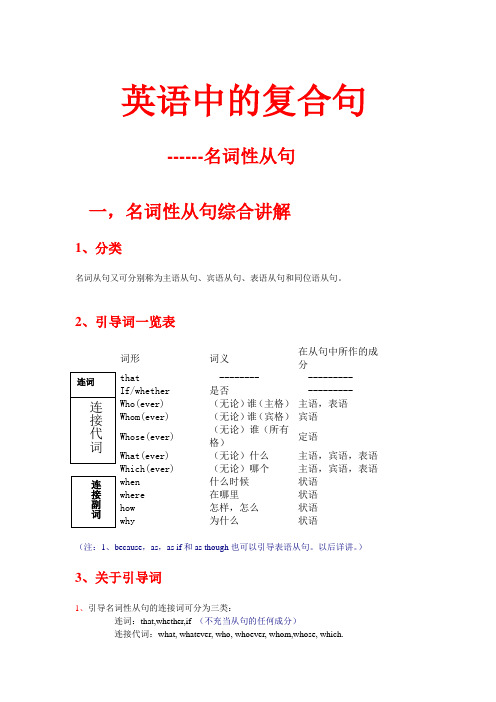
英语中的复合句 ------名词性从句一,名词性从句综合讲解1、分类名词从句又可分别称为主语从句、宾语从句、表语从句和同位语从句。
2、引导词一览表词形 词义 在从句中所作的成分 that -------- ---------If/whether 是否 --------- Who(ever) (无论)谁(主格) 主语,表语Whom(ever) (无论)谁(宾格) 宾语Whose(ever) (无论)谁(所有格) 定语What(ever) (无论)什么 主语,宾语,表语Which(ever) (无论)哪个 主语,宾语,表语when 什么时候 状语where 在哪里 状语how 怎样,怎么 状语 why 为什么 状语(注:1、because ,as ,as if 和as though 也可以引导表语从句。
以后详讲。
)3、关于引导词1、引导名词性从句的连接词可分为三类:连词:that,whether,if (不充当从句的任何成分)连接代词:what, whatever, who, whoever, whom,whose, which. 连词 连接代词 连接副词连接副词:when, where, how, why2、that引导名词性从句,本身无词义,也不作从句中任何成分。
名词性that-从句在句中能充当主语、宾语、表语、同位语和形容词宾语。
例如:主语:That he is still alive is sheer luck. 他还活着全靠运气。
宾语:John said that he was leaving for London on Wednesday. 约翰说他星期三要到伦敦去。
表语:The fact is that he has not been seen recently. 事实是近来谁也没有见过他。
同位语:The fact that he has not been seen recently disturbs everyone in his office.近来谁也没有见过他,这一事实令办公室所有的人不安。
名词性从句讲解及专项练习习题及解答
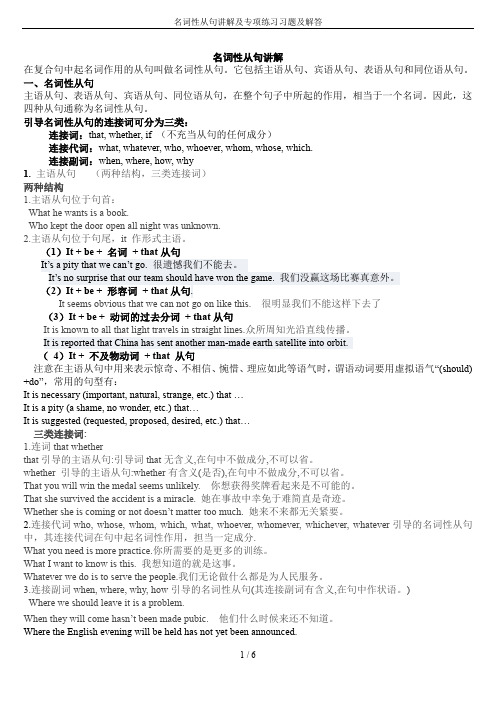
名词性从句讲解在复合句中起名词作用的从句叫做名词性从句。
它包括主语从句、宾语从句、表语从句和同位语从句。
一、名词性从句主语从句、表语从句、宾语从句、同位语从句,在整个句子中所起的作用,相当于一个名词。
因此,这四种从句通称为名词性从句。
引导名词性从句的连接词可分为三类:连接词:that, whether, if (不充当从句的任何成分)连接代词:what, whatever, who, whoever, whom, whose, which.连接副词:when, where, how, why1. 主语从句(两种结构,三类连接词)两种结构1.主语从句位于句首:What he wants is a book.Who kept the door open all night was unknown.2.主语从句位于句尾,it 作形式主语。
(1)It + be + 名词+ that从句It’s a pity that we can’t go. 很遗憾我们不能去。
It’s no surprise that our team should have wo n the game. 我们没赢这场比赛真意外。
(2)It + be + 形容词+ that从句.It seems obvious that we can not go on like this. 很明显我们不能这样下去了(3)It + be + 动词的过去分词+ that从句It is known to all that light travels in straight lines.众所周知光沿直线传播。
It is reported that China has sent another man-made earth satellite into orbit.(4)It + 不及物动词+ that 从句注意在主语从句中用来表示惊奇、不相信、惋惜、理应如此等语气时,谓语动词要用虚拟语气“(should) +do”,常用的句型有:It is necessary (important, natural, strange, etc.) that …It is a pity (a shame, no wonder, etc.) that…It is suggested (requested, proposed, desired, etc.) that…三类连接词:1.连词that whetherthat引导的主语从句:引导词that无含义,在句中不做成分,不可以省。
复合句-名词性从句
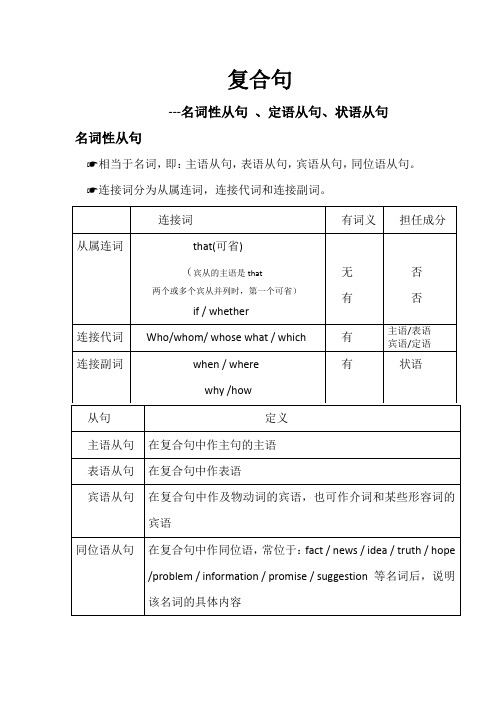
复合句---名词性从句、定语从句、状语从句名词性从句☛相当于名词,即:主语从句,表语从句,宾语从句,同位语从句。
☛连接词分为从属连词,连接代词和连接副词。
1.由从属连词引导→A. Whether he will come or not is not yet known.→B.The trouble is that he has never done the work before.→C.I think (that) watching TV too much is bad for peoples health.→D.I wonder whether it is true or not.→E. The hope that he may recover is not gone yet.2.由连接代词引导→A. Whoever is here gets a prize.→B. GuiLin is not what it used to be.→C. I wonder what has happened to him.3.由连接副词引导→A. Where he has been is still a puzzle.→B. That is why he did not pass the exam.→C. Do you know when he will leave for Hong Kong?→D.I have no idea when he will be back.4.it 作为形式主语代表主语从句/作为形式宾语代表宾语从句(及物动词+it +宾语补足语+宾语从句)→A. It doesn`t matter whether he will come or not .→B. I made it clear that I was determined to carry out the plan .→C. We think it possible that young people master at least two foreign languages.5.介词后的宾语从句→Tom is a nice boy ,except that he is sometimes late for school.→It depends on whether the manager will agree to the plan or not.6.某些形容词后的宾语从句→I am anxious that he will be able to pass the exam.→Mother was very pleased that her son had passed the national college entrance exam.7.宾语从句特点→从句时态取决于主句的时态→从句用陈述句语序→否定转移(主句的主语为第一人称,动词是“think/ believe / suppose”时,→I doubt whether he is telling the truth.→She has told me that she has never been to the Great Wall.→My grandpa told me that the earth is round .→She hesitated whether she would take our advice.→I don`t think he had been wrong .8.宾语从句转换为简单句的规则。
英语名词性从句讲解【完整版】

2、I asked him if he could do me a favor .
If与whether的区别:
1、If不能引导放于句首的主语从句,而whether可以。 2、引导表语从句用whether,不用if。 3、引导同位语从句用whether,不用if。 4、whether可以引导从句作介词的宾语,不用if 。 5、whether or not 连在一起可以,但if不可以。而 “whether-----or not = if -----or not”
同位语从句:
定义:在复合句中充当同位语的句子。 同位语从句用来对其前面的抽象名词进行解释说明,被解释说明的词和 同位语在逻辑上是主表关系。 同位语常见名词:fact, suggestion, advice, idea, decision, news, thought, hope, belief, truth, doubt, promise, possibility, truth, warning, message, reason, report, question,explanation, wish, problem等。 常见的连接词:that, whether, what, who, how, when, where等。 用法: The thought that I want to buy my mother a birthday gift makes me excited.that 引导的同位语从句,解释说明 thought,从句不缺成 分 There is some doubt whether he will come. whether 引导同位语从句,if 不能引导同位语从句 we haven’t made the decision where we are going to spend our vacation. 有时同位语从句可以不紧跟解释说明的名词后面。 The news is surprising that he won the match.
考研英语-英语复合句之名词性从句
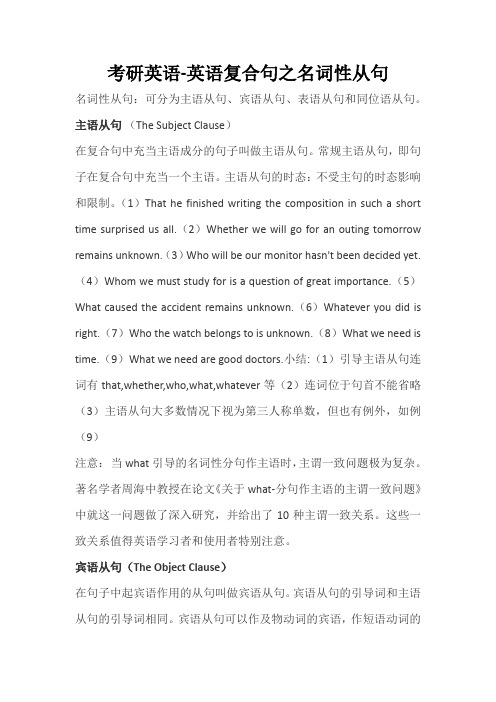
考研英语-英语复合句之名词性从句名词性从句:可分为主语从句、宾语从句、表语从句和同位语从句。
主语从句(The Subject Clause)在复合句中充当主语成分的句子叫做主语从句。
常规主语从句,即句子在复合句中充当一个主语。
主语从句的时态:不受主句的时态影响和限制。
(1)That he finished writing the composition in such a short time surprised us all.(2)Whether we will go for an outing tomorrow remains unknown.(3)Who will be our monitor hasn't been decided yet.(4)Whom we must study for is a question of great importance.(5)What caused the accident remains unknown.(6)Whatever you did is right.(7)Who the watch belongs to is unknown.(8)What we need is time.(9)What we need are good doctors.小结:(1)引导主语从句连词有that,whether,who,what,whatever等(2)连词位于句首不能省略(3)主语从句大多数情况下视为第三人称单数,但也有例外,如例(9)注意:当what引导的名词性分句作主语时,主谓一致问题极为复杂。
著名学者周海中教授在论文《关于what-分句作主语的主谓一致问题》中就这一问题做了深入研究,并给出了10种主谓一致关系。
这些一致关系值得英语学习者和使用者特别注意。
宾语从句(The Object Clause)在句子中起宾语作用的从句叫做宾语从句。
宾语从句的引导词和主语从句的引导词相同。
名词性从句讲解与练习
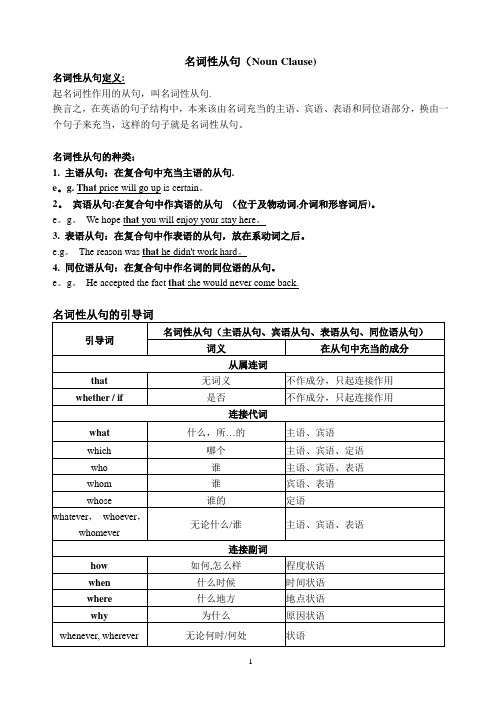
名词性从句(Noun Clause)名词性从句定义:起名词性作用的从句,叫名词性从句.换言之,在英语的句子结构中,本来该由名词充当的主语、宾语、表语和同位语部分,换由一个句子来充当,这样的句子就是名词性从句。
名词性从句的种类:1. 主语从句:在复合句中充当主语的从句.e。
g. That price will go up is certain。
2。
宾语从句:在复合句中作宾语的从句(位于及物动词,介词和形容词后)。
e。
g。
We hope t hat you will enjoy your stay here。
3. 表语从句:在复合句中作表语的从句,放在系动词之后。
e.g。
The reason was that he didn't work hard。
4. 同位语从句:在复合句中作名词的同位语的从句。
e。
g。
He accepted the fact that she would never come back.一、从属连词:that/whether/if1、That we will realize our dreams in the future is certain . ()2、The fact is that he earned his passage by working as an unpaid hand。
()3、I know that well begun is half done 。
()4、He heard the news that Liuxiang set a new world record . ( )5、Whether she will come back on time depends on weather 。
( )6、The problem is whether you could give us some valuable advice . ()7、I asked him whether he could do me a favor . ( )8、Could you tell me the question whether English is useful for us now。
名词性从句 语法

名词性从句一、名词性从句的基本概念在复合句中起名词作用的从句叫名词性从句,包括作主语从句、表语从句、宾语从句和同位语从句。
(1)主语从句就是在复合句中作主语的从句。
主语从句常用that, whether, who, whom, whose, what, which, when, where, how, why, whatever, whoever等引导。
如:Whether he will be able to come remains a question. 他是否来还是问题。
That China is a great socialist country is well known. 众所周知,中国是一个伟大的社会主义国家。
注:为避免头重脚轻,使句子平衡,常用it作形式主语,而将主语从句后置。
如上述第二例常说成:It is well known that China is a great socialist country.但是,由连接代词what, whatever, whoever等引导的主语从句一般不能用形式主语。
如:What he found surprised me greatly. 他的发现使我非常吃惊。
Whoever is finished may rest. 凡是做完工的人都可以休息。
(2)表语从句就是在连系动词之后作表语的从句。
引导表语从句的连接除与引导主语从句的连接词外,还有as if,as though。
如:The question is whether he is able to do it alone. 问题是他能否单独做这件事。
It looks as if (though) it is going to snow. 天好像要下雪似的。
注意:要区分以下句式:1. that’s why+结果;that’s because+原因。
2. the reason why /for…is that…He is absent. That’s because he is ill. 他缺席,这是因为他生病了。
名词性从句总结

名词性从句总结complex sentence noun clause (名词性从句)(复合句)attributive clause (定语从句)adverbial clause (状语从句)名词性从句1.概念:在句子中起名词作用的句子叫名词从句.名词从句的功能相当于名词词组, 它在复合句中能担任主语、宾语、表语、同位语等,因此根据它在句中不同的语法功能,名词从句可分为主语从句subject clause名词性从句宾语从句object clausenoun clause 表语从句predicative clause同位语从句appositive clause一、主语从句Subject Clauses1.主语从句:从句在句中充当主语成分1). That he will succeed is certain . 他会成功是肯定的2) Whether he will go there is not known .是否他去那儿还不知道3) What he said is not true . 他说的话不是真的4) Whoever comes is welcome.无论谁来都是受欢迎.2.引导词:1)从属连词: that, whether2)疑问代词: what, which, who, whom, whose3)疑问副词: when, where, why, how4)复合关系代词: whatever, whichever, whoever, whomever考点一:主语从句后置!为了避免主语冗长,句子头重脚轻,经常用it作形式主语,主语从句放在后面作真正的主语.例:1).That we shall be late is certain.-- It‟s certain that we shall be late.2). That the earth is round is known to all.--It‟s known to all that the earth is round.It 的用法:(形式主语)考点二:主谓一致1. What we used to think impossible now does seem possible. (2006天津)A.isB.wasC.has beenD.will be2. Most of what has been said about the Smiths ______also true of the Johnsons.(2006安徽)A.are B.is C.being D.to be3.When and where the meeting will begin _____(have) not been decided yet .4. When they will start and where they will go ____(have) not been decided yet .总结归纳:1.一个主语从句做主语,谓语动词用单数;2.由两个或多个连接词引导一个主语从句,谓语动词用单数;3如果由and 连接两个或两个以上的主语从句做主语时,谓语动词用复数;4.What引导的主语从句可根据其表语确定单数或复数意义。
复合句的主从结构

复合句的主从结构复合句是由主句和从句构成的句子。
主从结构是复合句中的一种句法结构,主句是复合句的核心,从句在句子中起到修饰、补充、解释等作用。
掌握复合句的主从结构对于写作和阅读理解都至关重要。
本文将详细讨论复合句的主从结构及其用法。
一、主从结构的基本概念主从结构是指主句和从句之间的关系。
主句通常是完整的句子,可以独立成为一个句子进行表达。
而从句则依附于主句,没有完整的句意,需要主句的支撑。
主句和从句之间通过关联词或引导词来建立联系。
主从结构有三种类型:名词性从句、定语从句和状语从句。
名词性从句在复合句中充当名词的成分,可作主语、宾语、表语等。
定语从句用来修饰主句中的名词或代词。
状语从句则表示时间、原因、条件、目的等相关状况。
二、主从结构的用法和例句1. 名词性从句名词性从句可以充当主句中的名词成分,承担主语、宾语、表语等作用。
常见的引导词有:“that”、“whether”、“if”、“who”、“which”、“when”、“where”、“why”等。
例句:- He said that he would come to the party.(他说他会来参加聚会。
)- I don't know whether he is telling the truth or not.(我不知道他是否说的是真话。
)- She asked me if I had finished my homework.(她问我是否完成了作业。
)2. 定语从句定语从句用来修饰主句中的名词或代词,对主句中的名词进行限定、补充或解释。
常见的引导词有:“who”、“which”、“that”、“whom”、“where”、“when”等。
例句:- The book which is on the table is mine.(在桌子上的那本书是我的。
)- The girl who is singing is my sister.(正在唱歌的女孩是我的姐姐。
高中英语语法知识之名词性从句

名词性从句相关概念名词性从句:在复合句中起名词的从句叫做名词性从句。
包括:主语从句、宾语从句、表语从句、同位语从句。
名词性从句引导词:●连接词 that引导名词性从句时,只起连接作用,没有任何意思,也不充当句子成分。
I hope (that) you enjoy your holiday.That he likes you is very obvious.●连接词 whether, if引导名词性从句时,不充当句子成分,但有自己的意思,表示“是否”He asked whether [if] I would show him the way.Whether it will do us harm remains to be seen.●连接代词 who, whom, whose, which, what, whatever, whoever, whomever, whichever引导名词性从句时,均有各自的意义,在从句中作主语、宾语、定语等。
如:Who broke the glass yesterday is not clear.She will give whoever needs help a warm support.●连接副词 when, where, why, how, however, whenever, wherever引导名词性从句,也各自有自己的意义,在从句中作状语。
The question is how we should carry out the plan.When she’ll be back depends much on the weather.宾语从句★位置:A. 作动词宾语He has informed me when they are to discuss the work plan.注意:doubt(怀疑)的肯定句接if/ whether引导的宾语从句,但否定句和疑问句接that引导的宾语从句。
高中英语语法复习—复合句(名词性、定语从句、状语从句)精析

复合句一. 名词性从句:1.名词性从句主要分为四大类:主语从句、宾语从句、表语从句和同位语从句。
是由if, whether, that 和各种疑问词充当连接词所引导的从句,其功同名词一样。
2.名词性从句的语序:名词性从句在句中要用陈述句语序。
如:He asked me what was the matter with me.We’ve heard the news that we’ll move into the new house.Whatever you say will interest us all.(一)主语从句1.定义:主语从句是在复合句中充当主语的从句,通常放在主句谓语动词之前或由形式主语it代替,而本身放在句子末尾。
用作主语的从句叫做主语从句。
2.构成:关联词+简单句3.引导主语从句的关联词有三类:1) 从属连词that:由that引导的从句,通常用形式主语来代替。
That he has disappeared worries his parents.It worries his parents that he has disappeared.It is not likely that he can win the lottery.It is a big surprise that he is still alive.2) 从属连词whether。
如:Whether he’ll come here isn’t clear. 他是否会来这里还不清楚。
Whether or not she will go to Japan is up to her.Whether he will take part in the play is not clear.3) 连接代词who, whom, whose, what, which, whoever, whatever, whichever由what等代词引导的从句,表示”所1的(东西)”,实际上等于一个现行词加上一个定语从句,也可以由-ever等代词引导。
(八) 复合句——名词性从句
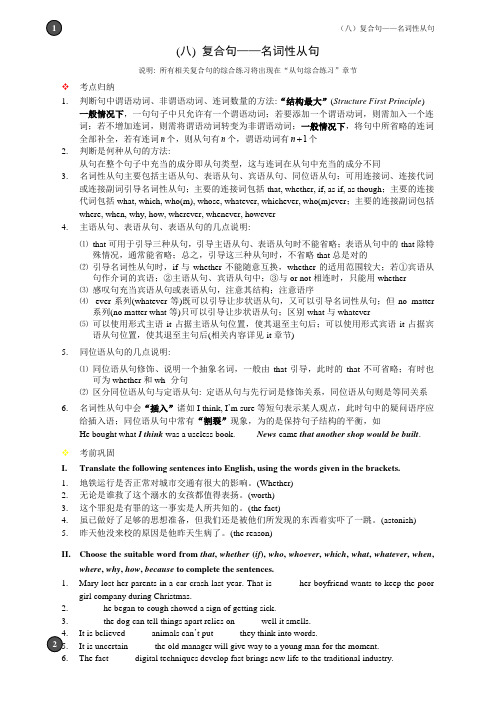
(八)复合句——名词性从句(八) 复合句——名词性从句说明: 所有相关复合句的综合练习将出现在“从句综合练习”章节❖考点归纳1.判断句中谓语动词、非谓语动词、连词数量的方法:“结构最大”(Structure First Principle)一般情况下,一句句子中只允许有一个谓语动词;若要添加一个谓语动词,则需加入一个连词;若不增加连词,则需将谓语动词转变为非谓语动词;一般情况下,将句中所省略的连词全部补全,若有连词n个,则从句有n个,谓语动词有1n 个2.判断是何种从句的方法:从句在整个句子中充当的成分即从句类型,这与连词在从句中充当的成分不同3.名词性从句主要包括主语从句、表语从句、宾语从句、同位语从句;可用连接词、连接代词或连接副词引导名词性从句;主要的连接词包括that, whether, if, as if, as though;主要的连接代词包括what, which, who(m), whose, whatever, whichever, who(m)ever;主要的连接副词包括where, when, why, how, wherever, whenever, however4.主语从句、表语从句、表语从句的几点说明:⑴that可用于引导三种从句,引导主语从句、表语从句时不能省略;表语从句中的that除特殊情况,通常能省略;总之,引导这三种从句时,不省略that总是对的⑵引导名词性从句时,if与whether不能随意互换,whether的适用范围较大;若①宾语从句作介词的宾语;②主语从句、宾语从句中;③与or not相连时,只能用whether⑶感叹句充当宾语从句或表语从句,注意其结构;注意语序⑷-ever系列(whatever等)既可以引导让步状语从句,又可以引导名词性从句;但no matter系列(no matter what等)只可以引导让步状语从句;区别what与whatever⑸可以使用形式主语it占据主语从句位置,使其退至主句后;可以使用形式宾语it占据宾语从句位置,使其退至主句后(相关内容详见it章节)5.同位语从句的几点说明:⑴同位语从句修饰、说明一个抽象名词,一般由that引导,此时的that不可省略;有时也可为whether和wh-分句⑵区分同位语从句与定语从句: 定语从句与先行词是修饰关系,同位语从句则是等同关系6.名词性从句中会“插入”诸如I think, I’m sure等短句表示某人观点,此时句中的疑问语序应给插入语;同位语从句中常有“割裂”现象,为的是保持句子结构的平衡,如He bought what I think was a useless book. News came that another shop would be built.❖考前巩固I. Translate the following sentences into English, using the words given in the brackets.1.地铁运行是否正常对城市交通有很大的影响。
名词性从句基本讲解
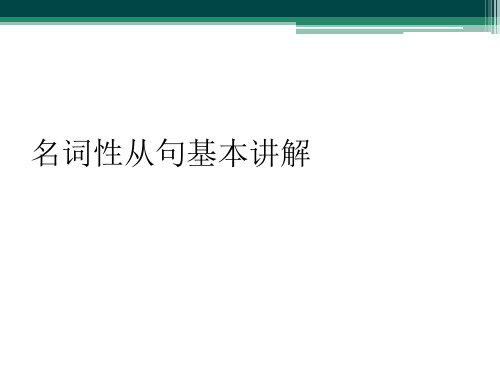
A.what
B.whose
C.which
D.that
解析:句意:知道当我们不在家时狗将会得到很好的照顾真
好。动词know后是宾语从句,从句中不缺成分,用that起连
接作用。
第二部分 语法考点突破
7.(2013·高考湖南卷)Do not let any failures discourage you
that引导主语从句时,仅仅起连接作用,不作句子成分,但
不能省略;who指人;which引导名词性从句时与what的区
别在于它为特指,而what为泛指。故正确答案为B项。
第二部分 语法考点突破
3 . (2013·高 考 北 京 卷 )Experts believe__C______people can
though,who, whose,which,
how,when, where,why, what,whatever,
whoever,
wherever
Whether he will come or not doesn’t matter much. Whoever comes here will be welcome.
注意事项
1.如果主句是现在时,宾语从句的 时态可根据实际情况而定;如果 主语是过去时,则宾语从句一定 要用过去时态。 2.宾语从句要用陈述句语序。 3.主句的谓语动词是及物动词feel, see,hear,find,think,make等, 可以用it作形式宾语,把宾语从句 放在补足语之后。 4.当主句的谓语是suggest, demand,insist等动词时,宾语从 句中的谓语动词用原形或should+ 动词原形。 5.当及物动词doubt接宾语从句, 主句为否定句或疑问句时,用连 词that;主句为一定句时,用连词 if/whether。
复合句之名词性从句(1)
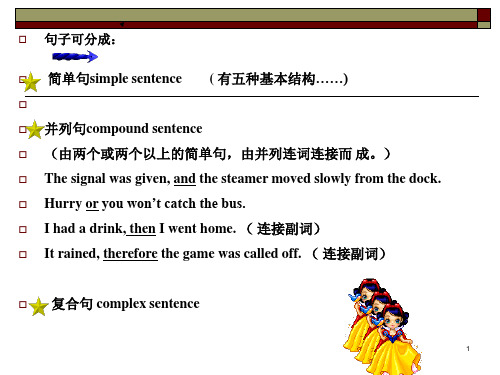
province. (间接引语)
11
Both of them agreed _________ ( 这是个好主意). I know ________ ( 你指的是什么). She didn’t say ________ ( 她什么时候离开). The man asked _________ ( 你是否要这张票). I’ll be very interested in ________ ( 你要做什么). The boy is afraid that _________ ( 不允许他进去).
/often 等。
3
1.主语从句 (Subject Clause )
主语从句在句中作主语。引导主语从句的关联词有从属连词、连接代
词、连接副词等,它们在句中一般不能省略。
How they get rid of poverty is a big problem. That mathematics finds its use in every science is evident. Whoever is tired may rest. Why the earth moves round the sun is quite clear now.
Do you know who invented telephone?
He will write to us about what he saw in England.
9
注意: (1) 宾语从句后有宾语补足语时,常将从句移至句末,而用 it 做形式宾语放在
前面。
I think it fit that you take over the business.
名词性从句梳理

名词性从句梳理一、名词性从句梳理基础知识回顾知识讲解主语从句:做主语用的名词性从句,因其在复合句中做主语,又称主语从句,引导主语从句的有连词that ,whether,连接代词who ,what ,which,连接副词when,where,how,why等。
1)从属连词:that,whether等.that 引导主语从句只起引导作用,本身无实际意义,在主语从句中不充当任何成分,但不能省略。
That he will win is certain.他肯定会赢。
Whether he’ll come here isn’t clear. 他是否会来这里还不清楚。
注意: 由that 引导的主语从句有时为了使句子结构平衡, 避免“头重脚轻”, 常用it 作形式主语, 而把从句放在后面。
例如:That he will refuse this piece of advice is impossible.It is impossible that he will refuse this piece of advice.it为形式主语2. That they should like each other is natural.It is natural that they should like each other.这样就构成了下面一些常用句型:1) It is + n. +从句It is a pity/shame that... 遗憾的是……It is a surprise that…令人惊奇的是…It is a fact that……是事实It is common knowledge that……是常识2) It is + adj. +从句It’s certain that…肯定…It is possible that... 很可能……I. 名词性从句的引导词:1.连接词:that、if、whether不作成分无意义“是否”2. 连接代词:who、whom 、whose、what、which 、whoever, whatever作主/宾/表3. 连接副词:when、where、why、how作状语1. The suit fitted him well except ________ the color was a little brighter.2. Eat whichever cake you like and leave the others for _______ comes in late.3. I told him _______ I was surprised at his attitude towards his study.It is known to all that we have been debating on the problem of pollution for decades.8. 这种植物怎样腐烂,为什么会腐烂仍然是个未知数。
复合句之名词性从句
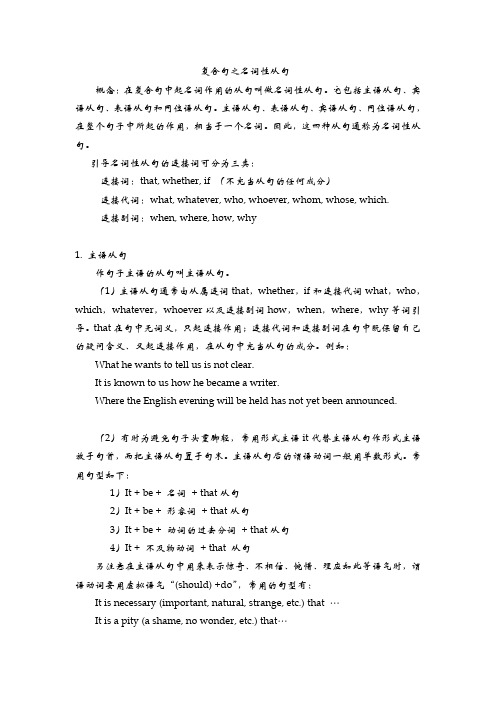
复合句之名词性从句概念:在复合句中起名词作用的从句叫做名词性从句。
它包括主语从句、宾语从句、表语从句和同位语从句。
主语从句、表语从句、宾语从句、同位语从句,在整个句子中所起的作用,相当于一个名词。
因此,这四种从句通称为名词性从句。
引导名词性从句的连接词可分为三类:连接词:that, whether, if (不充当从句的任何成分)连接代词:what, whatever, who, whoever, whom, whose, which.连接副词:when, where, how, why1. 主语从句作句子主语的从句叫主语从句。
(1)主语从句通常由从属连词that,whether,if和连接代词what,who,which,whatever,whoever以及连接副词how,when,where,why等词引导。
that在句中无词义,只起连接作用;连接代词和连接副词在句中既保留自己的疑问含义、又起连接作用,在从句中充当从句的成分。
例如:What he wants to tell us is not clear.It is known to us how he became a writer.Where the English evening will be held has not yet been announced.(2)有时为避免句子头重脚轻,常用形式主语it代替主语从句作形式主语放于句首,而把主语从句置于句末。
主语从句后的谓语动词一般用单数形式。
常用句型如下:1)It + be + 名词+ that从句2)It + be + 形容词+ that从句3)It + be + 动词的过去分词+ that从句4)It + 不及物动词+ that 从句另注意在主语从句中用来表示惊奇、不相信、惋惜、理应如此等语气时,谓语动词要用虚拟语气“(should) +do”,常用的句型有:It is necessary (important, natural, strange, etc.) that …It is a pity (a shame, no wonder, etc.) that…It is suggested (requested, proposed, desired, etc.) that…2. 宾语从句名词句用作宾语的从句叫宾语从句。
- 1、下载文档前请自行甄别文档内容的完整性,平台不提供额外的编辑、内容补充、找答案等附加服务。
- 2、"仅部分预览"的文档,不可在线预览部分如存在完整性等问题,可反馈申请退款(可完整预览的文档不适用该条件!)。
- 3、如文档侵犯您的权益,请联系客服反馈,我们会尽快为您处理(人工客服工作时间:9:00-18:30)。
复合句之名词性从句概念:在复合句中起名词作用的从句叫做名词性从句。
它包括主语从句、宾语从句、表语从句和同位语从句。
主语从句、表语从句、宾语从句、同位语从句,在整个句子中所起的作用,相当于一个名词。
因此,这四种从句通称为名词性从句。
引导名词性从句的连接词可分为三类:连接词:that, whether, if (不充当从句的任何成分)连接代词:what, whatever, who, whoever, whom, whose, which.连接副词:when, where, how, why1. 主语从句作句子主语的从句叫主语从句。
(1)主语从句通常由从属连词that,whether,if和连接代词what,who,which,whatever,whoever以及连接副词how,when,where,why等词引导。
that在句中无词义,只起连接作用;连接代词和连接副词在句中既保留自己的疑问含义、又起连接作用,在从句中充当从句的成分。
例如:What he wants to tell us is not clear.It is known to us how he became a writer.Where the English evening will be held has not yet been announced.(2)有时为避免句子头重脚轻,常用形式主语it代替主语从句作形式主语放于句首,而把主语从句置于句末。
主语从句后的谓语动词一般用单数形式。
常用句型如下:1)It + be + 名词+ that从句2)It + be + 形容词+ that从句3)It + be + 动词的过去分词+ that从句4)It + 不及物动词+ that 从句另注意在主语从句中用来表示惊奇、不相信、惋惜、理应如此等语气时,谓语动词要用虚拟语气“(should) +do”,常用的句型有:It is necessary (important, natural, strange, etc.) that …It is a pity (a shame, no wonder, etc.) that…It is suggested (requested, proposed, desired, etc.) that…2. 宾语从句名词句用作宾语的从句叫宾语从句。
引导宾语从句的关联词与引导主语从句表语从句的关联词大致一样,在句中可以作谓语动词或介词及非谓语动词的宾语。
(1)由连接词that引导的宾语从句由连接词that引导宾语从句时,that在句中不担任任何成分,在口语或非正式的文体中常被省去,但如从句是并列句时,第二个分句前的that不可省。
He has told me that he will go to Shanghai tomorrow.We must never think (that) we are good in everything while others are good in nothing.【注意】在demand、order、suggest、decide、insist, desire, demand, request, command等表示要求、命令、建议、决定等意义的动词后,宾语从句常用“(should)+ 动词原形”。
例如:I insist that she (should) do her work alone.The commander ordered that troops (should) set off at once.(2)用who,whom, which, whose, what, when, where, why, how, whoever, whatever, whichever等关联词引导的宾语从句相当于特殊疑问句,应注意句子语序要用陈述语序。
I want to know what he has told you.She always thinks of how she can work well.She will give whoever needs help a warm support.(3)用whether或if引导的宾语从句,其主语和谓语的顺序也不能颠倒,仍保持陈述句语序。
此外,whether与if 在作“是否”的意思讲时在下列情况下一般只能用whether,不用if:a. 引导主语从句并在句首时;b. 引导表语从句时;c . 引导从句作介词宾语时;d. 从句后有“or not”时;e. 后接动词不定式时。
Whether there is life on the moon is an interesting question.Everything depends on whether we have enough money.3. 表语从句在句中作表语的从句叫表语从句。
引导表语从句的关联词与引导主语从句的关联词大致一样,表语从句位于连系动词后,有时用as if引导。
其基本结构为:主语+ 系动词+ that从句。
例如:The fact is that we have lost the game.That is why he didn’t come to the meeting.It looks as if it is going to rain.需要注意的,当主语是reason时,表语从句要用that引导而不是because。
The reason why he was late was that he missed the train by one minute this morning.4. 同位语从句同位语从句说明其前面的名词的具体内容。
同位语从句通常由that引导,可用于同位语从句的名词有advice、demand、doubt、fact、hope、idea、information、message、news、order、problem、promise、question、request、suggestion、truth、wish、word等。
例如:The news that we won the game is exciting.I have no idea when he will come back home.The thought came to him that Mary had probably fallen ill.【注】同位语从句和定语从句的区别:that作为关系代词,可以引导定语从句,充当句子成分,在从句中作宾语时可以省略;that引导同位语从句时,起连词的作用,没有实际意义,不充当句子成分,一般不能省略。
试比较下面两个例句:I had no idea that you were here.(that引导同位语从句,不能省略)Have you got the idea(that)this book gives you of life in ancientGreece?(that引导定语从句,作宾语,可以省略)【基础巩固理解运用】1. His success was because of ________ he had been working hard.A. thatB. the fact whichC. the fact thatD. the fact2. “Is Mary from New York City”“I don't know _______.”A. from what city does she come fromB. from what city she comeC. what city does she come fromD. what city she comes from3. ________ makes mistakes must correct them.A. WhatB. ThatC. WhoeverD. Whatever4. The reason why I didn't go to Shanghai was ________ a new job.A. because I gotB. because of gettingC. I gotD. that I got5. It worried her a bit ____ her hair was turning grey.A. whileB. thatC. ifD. for6. Henry killed the dog. I'll ask him why ________.A. did he do thatB. he did thatC. he didD. he has done so7. Have you seen Henry lately My boss wants to know ________.A. how he is getting alongB. how is he getting alongC. what he is getting alongD. what is he getting along8. It is generally considered unwise to give a child ____ he or she wants.A. howeverB. whateverC. whicheverD. whenever9. He asked me ________ with me.A. what is the troubleB. what wrong wasC. what was the matterD. what trouble it is10. I am sure ________ he said is true.A. thatB. about thatC. of thatD. that what11. When and why he came here ________ yet.A. is not knownB. are not knownC. has not knownD. have not been known12. I wonder how much ________.A. does the watch costB. did the watch costC. the watch costedD. the watch costs13. Mary is ________ someone might recognize her.A. afraid ofB. afraid aboutC. afraid thatD. afraid for14.________ is no reason for dismissing her.A. Because she was a few minutes lateB. Owing to a few minutes lateC. The fact that she was a few minutes lateD. Being a few minutes late15. They came to the conclusion ________ by a computer.A. that not all things can be doneB. because of not all things be doneC. being not all things can be doneD. because not all things can be doneKeys:1-5 CDCDB 6-10 BABCD 11-15 DDCCA1. Why the explosion occurred was ________ the laboratory attendant had been careless.A. forB. becauseC. sinceD. that2. I don't doubt ________ he'll come.A. thatB. ifC. whatD. whether3. —“Why did you go to the wrong class, Mr. Wang”—“Well, I forget _______ I was supposed to go to.”A. which the roomB. which roomC. what was the roomD. what room was it4. Output is now six times ________ it was before liberation.A. thatB. whichC. whatD. of which5. Mary: Helen is a mere washer woman, yet she's now buying a big house. Carol: Yes. Because she's always saved ________.A. what little she earnsB. how little she earnsC. for little she earnsD. with little she earns6. ______ surprised me most was ______ such a little boy of seven could playthe violin so well.A. That…whatB. What…thatC. That…whichD. What…which7. We gave him ________ help we could.A. whichB. whatC. thatD. this8. She is pleased with what you have given him and ________ you have told him.A. thatB. whichC. all whatD. all that9. Excuse me would you please tell me ________A. when the sports meet is taken placeB. when is the sports meet going to be heldC. when is the sports meet to beginD. when the sports meet is to take place10. Do you happen to know ________A. what size shoes he wearsB. how big shoes he wearsC. what is the size of his shoesD. what number shoes are his一、名词性从句概念:在复合句中起名词作用的从句叫做名词性从句。
